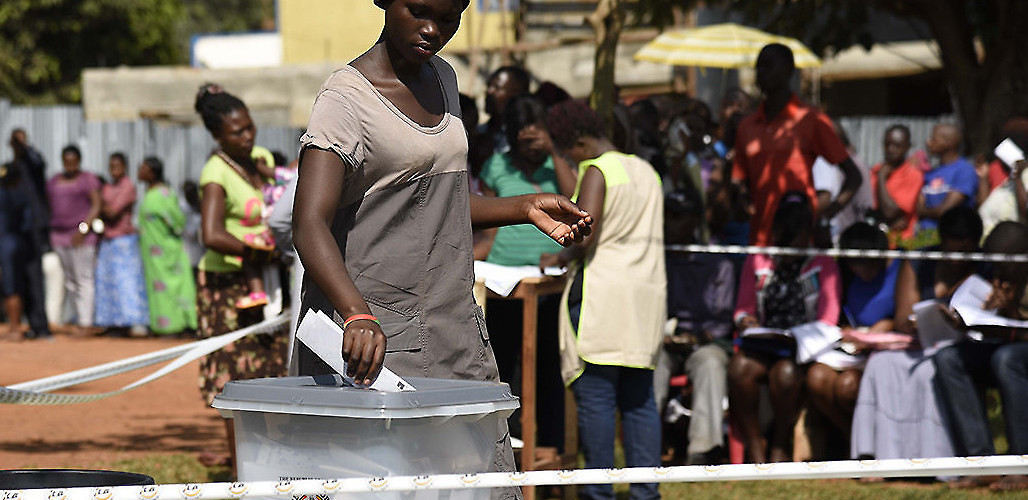Voters cast their ballots in today's Ugandan presidential and parliamentary polls. Nasuti, Uganda, February 18, 2016. ( Isaac Kasamani/AFP/Getty)
Ugandans are voting in a presidential election today, in what is shaping to be one of the most competitive polls in the country’s history. The election will see President Yoweri Museveni attempt to extend his near 30-year rule, against the challenge of seven other aspirants. Foremost among these is the president’s longtime opponent Kizza Besigye, who has contested three previous ballots, garnering 37% of the vote in his most successful showing, in 2006.
Former prime minister Amama Mbabazi is also staking a claim. Considered to be among the most powerful men in Ugandan politics, perhaps second only to Museveni, Mbabazi was alleged to be mounting a challenge for the position of presidential flag-bearer for the ruling National Resistance Movement (NRM) ahead of this election. Despite denying he had such plans, Mbabazi was expelled from the government. The remaining, lesser-known candidates include an evangelist; a university professor; a veterinarian; and the sole female contender, Maureen Kyalya.
Tensions in the country have been high, and violence has already marred proceedings. A Besigye supporter was killed in clashes with police on Monday. This followed incidents, in mid-December, of Mbabazi supporters violently dispersing NRM activists. Bisigye supporters also clashed with security forces who they accused of attempting to blockade the candidate’s convoy. According to the Ugandan Human Rights Commission, Ntungamo and Mbarara are two of 59 localities deemed high-risk for outbreaks of election-related violence. Meanwhile, Museveni has blocked access to social media, supposedly to stop people “telling lies.”
As with previous occasions, many feel that the election is Museveni’s to lose. Significant financial resources, control of the Ugandan state apparatus, and the ability to influence voters through patronage are among the many advantages he has over opponents. That said, his edge is not as sharp as it use to be. Systemic corruption, socio-political oppression, and years of economic hardship have chipped away at Museveni’s popularity.
Current indications are that the drop in the president’s popularity will continue. According to opinion polls by the Kampala-based Research World International, Museveni is expected to secure 51% of the ballot, while Besigye and Mbabazi are forecast to secure 32% and 11% respectively. Although this will see the incumbent receive a 17% lower share of the vote than in 2011, it will nonetheless be just enough for Museveni to avoid a dreaded presidential runoff election. In the event of a runoff, Museveni could go head-to-head with either Besigye or Amabazi, who could realistically receive the endorsement of the opposing political camp. A runoff could therefore pose the most serious threat to Museveni’s political monopoly.
But electoral opinion polls in Uganda may not be the most accurate measure of the political climate in the country, particularly given accusations of intimidation and repression of Ugandans who are publicly displaying their disenchantment with Museveni’s rule. One who has first-hand experience of such oppression, and who is unlikely to be persuaded by opinion polls, is Besigye. Once serving as Museveni’s private physician, he broke ranks with the president and the NRM in 1999 and has since contested the Ugandan presidency on three separate occasions, in 2001, 2006, and 2011.
As Ugandan journalist and analyst Rosebelle Kagumire notes, “there may be something different in the air” for Besigye the fourth time around. According to Kagumire, he has drawn massive crowds to his campaign events, even in areas which have traditionally been considered strongholds of Museveni and the NRM. Besigye’s seemingly burgeoning support was likely elicited from the opposition leader’s commitment to raising awareness of socio-economic grievances experienced by millions of Ugandans, which include poverty, unemployment, and rising costs of living. His willingness to address these issues even amid violent crackdowns has further increased his stock among many Ugandans, particularly the youth who bear the brunt of the country’s problems. The challenge for Besigye, however, will be to present himself as an agent of change, as opposed to an opposition politician obsessed with usurping Museveni.
While the election will likely serve as a platform for the long-standing rivalry between Museveni and Besigye, the impact of Mbabazi should not be underestimated. He is still believed to garner significant respect, and possibly support, among the elites of the NRM, and has the political network, and financial clout, to mount a challenge. On the other hand, International Crisis Group analyst Magnus Taylor argues that Mbabazi’s political and financial resources may be viewed as testament to his former association with Museveni—an association that may see him viewed with contempt by those opposed to the president’s rule.
Mbabazi could nonetheless draw support from NRM supporters disenchanted with their long-serving leader. This could potentially push Museveni’s support below the 50% threshold, forcing the incumbent into the unfamiliar, and perhaps unpredictable, run-off territory. Under this scenario, Mbabazi could face the option of putting his support behind Besigye and potentially dismantling a political dynasty he helped build and nurture.





